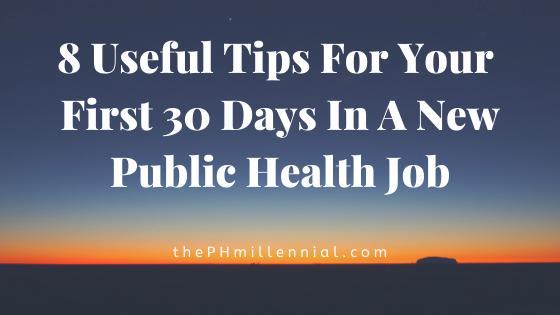So you got your new job and you start tomorrow. How excited are you to make a great first impression with your colleagues and a meaningful impact in your new role?
Your first 30 days in your new public health job is important for you to get in the right mindset to get the most out of your new role. The 30 day, 90 day, 6 month, and 1 year time points can be gauges to focus on different things throughout your new career shift.
The field of public health is a huge and exciting one. I can personally say that the first 30 days of a new job truly flies by. In order to get the best grasp of your new role, you should go into your first 30 days prepared. Use these 8 useful tips for your first 30 days in your new public health job.
Many of these same tips can be applied to your internships or volunteer experiences.
Support The Public Health Millennial on BuyMeACoffee
(Related: Tips to Ace Your Interview)
1. Introduce Yourself. Use Your Why.
Hey so you’re in your new position – it’s a great time to refresh on what you’ve done in previous roles. Also add in what you think your bring to this new role or what about the company you are excited about.
It’s a great idea to also include the why for choosing this new job. This will help make the introduction stand out more. Why did you want this role? Why are you passionate about the new role? Why did you choose this company over another?
If you are nervous, take some time to practice your introduction. By the end of the 30 days you’ll be sure to have your introduction locked and loaded.
2. Check In With Your Manager
The relationship you have with your manager can truly make or break a new position. In your first 30 days, you want to check in with your manager weekly at the least. Make sure that you are supported and know what you need to do in your first 30 days.
You can also start to learn what you can do to make your boss’s job easier – always a great idea!
Understand what your performance metrics are going to be. This will help you best align your goals and actions with what will make you most successful in your position. Learn how to best ask questions and make communications with your manager.
3. Take Notes
There is going to be a lot of new things coming at you in your first 30 days. Your brain can only take in so much information without blanking on the rest. Take the time tested method of writing down notes. Write notes for everything can help make your job a lot easier. Heck, it’ll probably make the questions you are able to ask in meetings more relevant!
Take notes in meetings. Jot down notes of information about colleagues – what are their partner’s or pet’s names? Learn the organizational chart. Write down acronyms and other words that came up that you didn’t know – ask about them during/after the meeting or do research on your own.
There is no better weapon than a sharp pen (or laptop) to take notes to help your brain later on!
4. Learn All You Can About Organization & Role
You are going to want to firstly, at the least know the organizations mission, vision, and values. Learn about the organization in-depth. You will want to be able to answer common and not so common questions that persons outside your organization ask.
Who do you all serve? What regions do you work with? What has the organization done in the months/years prior to you coming onboard.
As you learn more about the organization, it will help you better understand your role. What’s within the scope of your role? How do you interact with different staff members? What organizations does yours routinely collaborate with? How is your interaction with external organizations/clients/population you serve.
There is never too much information you can know about your organization and your role. When you least expect it, you will get a really weird question that luckily you have the answer to through your tireless prodding for information lol.
5. Learn The Public Health Context
Public health though universal, is different in all locations you go to. Populations change, issues change, barriers change, community assets/resources change, policies change. So much is different in the work you are going into when moving locations in public health.
In your first 30 days, you should aim to learn more about the area that you are going to be working in. This can be from talking to colleagues and other community partners or through getting on relevant newsletter list. Most if not all states have an organization that reports on public health and other health related activities – find out what that organization is and sign up for their newsletter.
Don’t ever go into a community thinking that you know everything! The community has so much to teach you once you are open to learning. This is effective public health. Learn the culture of the people and take always use cultural competency as you can.
6. Get To Know Your Colleagues
You are going to be spending a lot of time with your colleagues – it’s in your favor to get to know them. Everyone works differently. People in the same roles may do work differently, so be aware of this. Learn communication styles and personality traits of your colleagues as quickly as possible!
I also think it is important that you are able to connect with your colleagues on a semi-personal level at least. People are people after all. We all have lives outside of work or some would say – it can all be one in the same.
So going back to ‘Take Notes’ you should learn about the professional and personal things about your colleagues – and write it down. You’ll learn how each of your colleagues likes to be communicated with, what gets them going, etc. Getting to know your colleagues can make your life and job that much more enjoyable.
7. Ask All The Questions
If there is one thing that I am an advocate of that many students (YES, YOU!) are scared of doing. The professor ask a questions and *crickets*! Get out of this mindset!
Questions are the key to success! Ask all the questions!
Not knowing something isn’t going to make you cool. It isn’t going to make your life easier. It is better to always ask the question so you have clarity. This is especially true if you are in your first 30 days. Asking questions and re-asking questions will help you to solidify the knowledge that will make your role that much easier.
8. Understand Company’s Culture
Of course, you asked questions that would help you understand the company culture before accepting the offer. Needless to say, what was said and what is actually the company culture may differ.
Take your first 30 days to observe and learn what the company culture and work environment is like. How does your boss and colleagues prefer to be contacted? Do meetings start promptly or is there time where you have casual conversations? Are you expected to be on call by text 24/7?
There are so many different ways organizations display their culture. Learn yours and find out how you best fit in. Shift the culture when necessary.
Bonus
Create and learn your pitch
You should also try to create your pitch when you get a good grasp of what you are doing in your role. When you introduce yourself in coalition meetings – what is your elevator pitch? How does your role play into your organizations mission?
This is something that you’ll get a grasp of after a week of so. But it will also need to be refined as you have better ways to express yourself in your new role.
Conclusion
So you recently started your new job, here are 8 useful tips that you can use to get the most out of your first 30 days.
Starting a new role can be hard, but with these tips you can position yourself to make the best of your first 30 days.
- Introduce Yourself. Use Your Why.
- Check In With Your Manager
- Take Notes
- Learn All You Can About The Organization & Role
- Learn The Public Health Context
- Get To Know Your Colleagues
- Ask All The Questions
- Understand Company’s Culture
Which of these tips will you pay attention to the most in your first 30 days in a new public health job?



